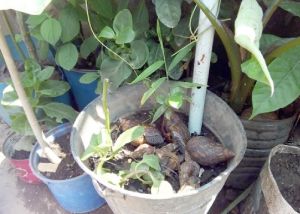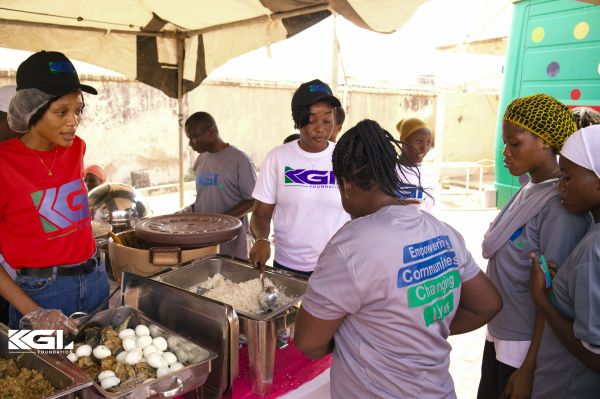
Ghanaians are a hardy bunch. When life gives them lemons, they make lemonade.
If you doubt it, check out the closest backyard and see how many gardens have sprouted in the COVID-19 environment.
Ghanaians from all walks of life have developed green thumbs.
Lettuce, cucumber, beans, spinach, kontonmire, okro, you name it, they have them growing in their backyards to beat the COVID-19 boredom.
Presently, it is common to see people turning backyard lawns in their homes into backyard gardens.
Even flower pots have not been spared as some are replacing their ornamental plants with crops.
Old containers have all been pressed into gardening
Those with enough land around their homes are equally cultivating cassava, plantain, jute leave (ayoyo), amaranth leaves (alefe), tomatoes, cabbages among others.
Those who love organic spices and herbs have also joined the train and it is common to see herbs in small containers lined up on windows and balconies of people’s homes.
Interestingly, some of the expatriates who are living in suburban gated communities are planting to feed themselves.
Some have chosen to grow their plants in old lorry tyres
At Manetville and Manet Court, gated communities around East Airport Residential area of Accra, some Indian expatriates, for instance, have planted bottle gourd, bitter gourd or karela , radishes, carrots, mint, in grow bags while others have their climbing plants such as the bottle gourd over their walls.
For those who do not have enough space or live in compound houses, containers, jute sacks, old lorry tyres, empty oil gallons and bottles for water dispensers have been pressed into gardening service.
Gardening has always been touted as a relaxing recreational activity that can provide great personal rewards.
During this time, when many people are working from home and students are learning from home, gardening can be a positive family-inclusive activity to adopt.
Benefits
Due to COVID-19 and lack of rains, some fruits and vegetables have become very expensive on the market.
It is no wonder some families have taken the initiative to cultivate their vegetables and so far they are making gains.
According to most people doing home gardening, it gives them instant access to fresh produce: you are not forced to visit the grocery shop, farmers market, or open markets to find vegetables and herbs.
Besides, depending on the type of vegetables one plants, you end up saving money on the food itself.
This kontonmire was harvested from a backyard garden
Peggy Ama Donkor, a broadcast journalist living around the Cantonments area of Accra, has utilised every space in her home to cultivate various fruits and vegetables.
For Peggy, it is a good save on her pocket and also useful source of organic vegetables from her garden all year-round.
Another journalist, Charles Okine, also planted lettuce, plantain, tomatoes, pepper, passion fruit among others in his backyard garden.
Justina Adams, a banker, has moved beyond planting vegetables in her home to the rearing of snails and cultivating mushrooms for the household.
“I used to have few herbs in my flower pot but with the lockdown and working from home policy, I decided to add various edible plants and rearing of snails and mushrooms. I have about 15 hens that have also started laying eggs so I am saving a lot of money on food,” she hinted.
Fati Shaibu Ali, a graphic designer, told The Mirror she lives on the third floor of one of the Social Security and National Insurance Trust (SSNIT) apartments.
However, she is using her balcony to grow lettuce, ayoyo and coriander, chilli and mint in a plastic container.
“For some time now, I hardly buy lettuce or fresh mint for my tea and smoothies. I pick fresh mint all the time in my small balcony garden so these days I don’t go to the mall just for mint leaves,” she said.
Touching on the benefits on gardening during this global pandemic, Mr Ernest Mensah, a horticulturist, told The Mirror remote schooling was new for most students in the community.
“Hands-on activities such as gardening can encourage children to participate in a way that will enhance learning. Gardening can teach young, preschool- and elementary-aged children, to reinforce skills such as measurements, addition, subtraction, counting, sorting into categories and colours. Practising motor skills and learning work ethics are also life-skills taught through gardening.”
According to him, because of urbanisation, some schoolchildren have never seen a farm nor a garden in their lives. Therefore, from a mental aspect, growing a vegetable garden may be a way for adults and children to cope with boredom and help families gain a sense of security.
A bottle gourd plant cultivated on a wall
“Historical experiences during trying times have given us examples of how important gardening can be in our society. World War I (WWI) came with food shortages. Everyone in the United States was encouraged by the federal government to do a Liberty Garden.
"The US School Garden Army was formed during this era to teach children to garden and help them feel a sense of contribution towards the war effort. Liberty gardens went away soon after WWI ended in 1918 since a high percentage of America’s workforce was already engaged in farming and other agricultural jobs.
"In the 1930s the Great Depression, had millions of people out-of-work and desperately poor people engaged in gardening to survive. They grew a limited range of basic foods that were easy to grow, mostly potatoes and beans, that were filling, high in calories and nutritious,” he stated.
It looks like COVID-19 is making people revisit the era of the WWI and Operation Feed Yourself initiated in Ghana in 1972.
The difference is that this time it is not a policy under a military regime as it used to be but a voluntary venture for self-sufficiency and greening urban spaces.










